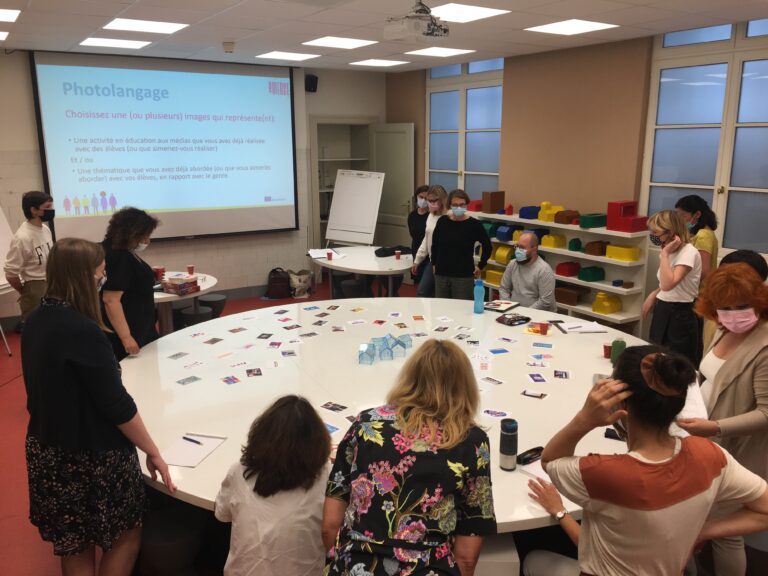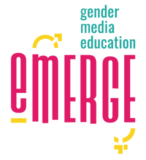Blog - Last news
STAY IN TOUCH WITH THE PROJECT
“Know the media culture of your student”: A collaborative work for pedagogical activities adapted to each teaching context.
Our goal was to create methodological activities to support teachers in knowing better the media practices of their students, regardless of their students’ background and regardless of their teaching context. To do this, we used a collaborative method to co-construct pedagogical activities with the eMERGE consortium as well as with groups of teachers from each of the partner countries (Belgium, Greece, Italy, Romania) between September 2020 and June 2021.
Step 1 : defining the objectives
With their expertise in pedagogy and media literacy, the partners of the eMERGE consortium (Média Animation ASBL, University of Palermo, Athens Lifelong Learning Institute and Mediawise society) gathered to define the specific objectives of the methodological kit and the indicators to evaluate it. The kit would:
Foster the emergence of media content that teachers didn’t suspect their students consume or that teacher didn’t know about
Encourage debate about media consumption in class (issues raised by students, contradictions discussed among the group)
Enable teachers to identify educational topics to explore more deeply with their students
Having these objectives in mind, members of the consortium elaborated a first draft of the methodological kit with some ideas of activities exploring different kind of media (information/learning, entertainment, games, social networks…) to survey the media practices of young people. This draft would serve as a first base for co-designing further the activities of the kit along with teachers.
Step 2: focus groups to collect expertise from teachers
The co-design of the methodological kit with teachers was based on a collaborative method called “focus-group” and consisted in discussing collectively with teachers the interim kit to adapt and review it to suit best their teaching context.
Before the focus group, teachers received the draft of the interim methodological kit. They were asked to read it and as a first task to identify the strong points and limits of each of the 6 activities of the kit, to evaluate their feasibility (what changes would they do to implement the activity in their classroom?) and to select the activities they would prefer to use in their classroom. The draft of the kit shared with teachers was designed to let them adapt themselves the content (i.e. the question cards or images for photo language were given as examples but teachers could decide to choose other questions or photos). The methodology used during the focus groups was collaborative and participative. This way, teachers would have a greater involvement in the co-design of the activities. To ensure the participation of all teachers (35 teachers in total), each partner used different online tools. The exchanges in small groups were designed to let participants share ideas to improve the activities and help them decide which activities they would experiment with their classroom.
Step 3: Confront the methodological kit with the reality of field
After the focus-groups step teachers have experimented the activities in their school context with their students. The experimentation of the methodological kit by teachers took place in the four partner countries from February to the end of April 2021 in each country. In total, the kit has been tested with more than 1000 students in 2021 across the four participating countries. Teachers were asked to fill a logbook and send their lesson plan of the activities tested in the classroom in order to keep track of their experience.
Step 4 Collecting experiences and finalizing the kit
After the experimentation process, the logbooks and lesson plans from teachers were collected. Post-experimentation focus-group sessions were held with teachers in each country to collect their feedback from the field in their national language and exchange on their experimentation. Recommendations and reviews from the teachers were gathered and translated by partners in their national report. From the recommendations of the four national reports, Media Animation ASBL finally reviewed and improved the activities of the methodological kit in order to make them as transferable as possible to any school contexts. The result of this co-design process is the methodological kit for teachers “Know the media culture of your students!”.
To be trained to gender media representation : what do the teachers think about ?

From Belgium :
![]() The Belgian teacher training took place during two days in the BELvue museum with 16 teachers on the 20th of September and on the 7th of October, 2021. In between the two days, the teachers had to complete online tasks on the e-learning platform. During the last day of the training, teachers had an activity to start working on the co-design of a learning scenario (output 3). After the training teachers were also encouraged to keep exploring the content of the e-learning platform.
The Belgian teacher training took place during two days in the BELvue museum with 16 teachers on the 20th of September and on the 7th of October, 2021. In between the two days, the teachers had to complete online tasks on the e-learning platform. During the last day of the training, teachers had an activity to start working on the co-design of a learning scenario (output 3). After the training teachers were also encouraged to keep exploring the content of the e-learning platform.
“From a somewhat nebulous and very broad notion, the training showed different angles of attack which makes it possible to better put the question of gender equality into perspective in the lessons to be given to students.” (College Teacher, Belgium).
“Working on stereotypes now seems more accessible to me, thanks to the media”.(College Teacher, Belgium).
“I use media education on a daily basis to help students reflect on what they “consume” in the media as discriminating stereotypes”.(College Teacher, Belgium).
![]()
From Greece
“The aspects that I liked the most about the training were the constructive participatory dialogue that was developed between trainers and trainees and the use of video and other media suitable for training on gender stereotypes and pop culture. Magazines, articles, descriptive images, videos, music, taken from everyday life facilitated our learning.” D.M. University student in Pedagogy
“The examples through commercials and excerpts from movies that became the subject of discussion during the training have helped us understand things that we had overlooked in the past by considering them as “normal”, while in reality they are not.” N.H. Primary School teacher
“The most useful aspect of the training was the realization that I can use pop culture in the classroom, as it offers plenty of materials to activate students and engage them on issues related to gender representations and stereotypes. The training made me realize the multiplicity of analyses I can initiate with my students from just a single scene of a video, an image, an advertisement” V.V. Secondary School teacher
These were only some of the reactions from the teachers who participated in the eMerge online training on the deconstruction of gender stereotypes and pop culture which took place on the 11th and 18th May 2022, in Greece. More than 20 teachers in Primary and Secondary Education as well as trainers in non formal education from different parts of Greece participated in the training. Its main aim was to empower them to design and implement educational activities for and with their students on gender representations in pop culture. Participants also studied the materials on the eMerge learning platform, which provided them with additional information and support on the practical use of the knowledge and skills they gained.
We are currently waiting for their Learning Scenarios after implementing them in their classrooms, with much enthusiasm!
From Italy
![]()
The interest and participation in the training of the teachers involved in the project was enthusiastic from the very beginning. The themes proposed have a significant impact on the students of middle and high school and the media education approach is connected with the development of transversal competencies and the newly introduced civic education discipline. The project is also interesting for the teachers because it promotes a very practical teaching approach. (Dario Ferrigno, teacher, Italy)
Consortium - Let’s meet them almost in person !

eMERGE Project is a transnational project carried on by four well-established media education organizations coming from Belgium, Greece, Italy and Romania. As media education resource center, as lifelong learning institute, as university and as NGO, these 4 main organizations put their knowledge and experience together for developing this media literacy project for a better gender equality !
You would find here the institutional presentation of the partners, but let’s meet them here as you would be at a meeting table with them.
Media Animation (Belgium) team was humorously classified as “model student”, the head of the classroom. They hardly prepare the meeting contents and share their experience with the other partners. Since they are not at their first media education project about gender representation and media literacy, they seem to always be one step ahead. But do not be fooled by appearances, they often have doubts, uncertainties and questions about the good way of raising awareness and training media educators about these hot topics !
Athens Lifelong Learning Institute (Greece) is the “business” partner around the table. European projects have no secrets from them anymore, they are involved in so many projects that they have a wide and impressive network around them, across Europe ! When the evening starts, it’s also them who will help you to relax with their artistic and cultural projects.
Mediawise society is a young and small organization. Her founder, Nicoleta Fotiade, is not only developing media education projects in Romania, she’s also fighting for the recognition of Media Education as a way of citizenship development even more for making awareness about gender equity in Romania. Thanks to the Mediawise team, the consortium fully perceives the activist dimension of a project like eMERGE. They are not only developing media literacy projects, they are struggling for and through them !
The University of Palermo (Italy) is the only research and scientist partner around the table. They take care of monitoring and collecting data about the activities tested and realized during the project. The UNIPA partners for this project are a duo of profiles “University Professor & school teacher” joining the consortium meetings and leading the project in Sicilia and this mix-delegation often brings a fresh wind to the project discussion. You can also count on them for not missing a beat of the Italian food culture.
